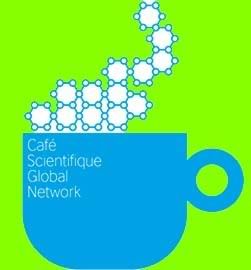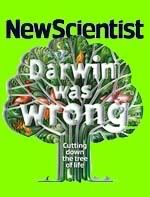 I have mixed feelings about the flu vaccination. I once had an argument with Professor Calculus, who said he'd had the flu jab every year it had been available, and hadn't had the illness since 1988. I replied that, never having had the jab, I too hadn't had the flu since 1988. But Calculus is somewhat older than me, so perhaps the jab is indicated in his case.
I have mixed feelings about the flu vaccination. I once had an argument with Professor Calculus, who said he'd had the flu jab every year it had been available, and hadn't had the illness since 1988. I replied that, never having had the jab, I too hadn't had the flu since 1988. But Calculus is somewhat older than me, so perhaps the jab is indicated in his case.So I was interested to read in the Cambridge News about a talk on the evolution of flu in Cambridge University's Leverhulme Centre for Human Evolutionary Studies as part of the celebrations for the bicentenary of Charles Darwin's birth.
The Leverhulme Centre was difficult to find at first, as there's a warren of throroughfares in that part of the city; but once I'd located Fitzwilliam Street the imposing, if foreshortened, façade was immediately visible. The glass doors opened automatically, which was a bit of a shame, because I'd been trying to read the finely-crafted inscriptions on them. I think they were quotes from Darwin.
The presentation was actually entitled the evolution of influenza viruses: seasonal flu
 and vaccines and was given by Dr Colin Russell of the university's Centre for Pathogen Evolution, and facilitated by Chris Smith, a doctor and scientist who presents the Naked Scientist show and podcast for BBC Radio Five Live, and also pops up on Australia's ABC Radio National; sponsorship was from British Council Bulgaria, who had supplied a video-link to a group of students in Sofia. I'm informed by the organisation's Lyubov Kostova that the BC in Bulgaria are still talking about his presentation!
and vaccines and was given by Dr Colin Russell of the university's Centre for Pathogen Evolution, and facilitated by Chris Smith, a doctor and scientist who presents the Naked Scientist show and podcast for BBC Radio Five Live, and also pops up on Australia's ABC Radio National; sponsorship was from British Council Bulgaria, who had supplied a video-link to a group of students in Sofia. I'm informed by the organisation's Lyubov Kostova that the BC in Bulgaria are still talking about his presentation!Dr Smith began the seminar by assuring us that his nudity was metaph
 orical, which was a relief. Dr Russell kicked off with the numbers, which I found surprising: 600 million people are infected worldwide with the influenza virus each year, leading to 100,000 hospitalizations every year in Great Britain, and 20,000 deaths. Russell is part of the World Health Organisation committee which analyses samples of bird flu, which often migrates across species to infect humans, to try to predict how the viruses will evolve in order to work out which ones to put into the vaccine which will try to protect vulnerable people from the disease at the end of this year. He will be part of the final decision-making process later this week.
orical, which was a relief. Dr Russell kicked off with the numbers, which I found surprising: 600 million people are infected worldwide with the influenza virus each year, leading to 100,000 hospitalizations every year in Great Britain, and 20,000 deaths. Russell is part of the World Health Organisation committee which analyses samples of bird flu, which often migrates across species to infect humans, to try to predict how the viruses will evolve in order to work out which ones to put into the vaccine which will try to protect vulnerable people from the disease at the end of this year. He will be part of the final decision-making process later this week.The problem is that every time a scientist makes a comment about flu vaccines or influenza-related mortality, the subject of the 1918 pandemic - named the "Spanish flu" or "Spanish Lady" because Spain was one of the few countries not to suppress reports of the attrition, which exceeded that of the Great War - comes up in an often unmeasured way in the populist press. Smith referred to a headline on the BBC website, which I haven't been able to find, which comprised the word FLU dripping with blood. "I'd long thought the BBC was a bastion of jounalistic integrity", he commented.
Russell referred to the flu pandemics of 1893, 1957 and 1968, which are mentioned much less often than the 1918 one, but which determined the shape of the seasonal influenza outbreaks between themselves and the next outbreaks. The reason 1918 was different, however, was that the thing reproduced so quickly that it was present in all organs - including the brain - and had elements of a haemorrhagic fever like the Ebola or the Hanta viruses, which came to us from animals.
Russell engaged both academics and eejits like me in seconds, and his talk was fascinating from beginning to end, alighting on many subjects: but it was here that my own interest was especially piqued. Ebola comes from bats, with whom it appears to have coexisted for so long that virus and bat do each other no harm. But then a bat bites a gorilla, which is found by a West African villager who is looking for bush-meat to sell and is, probably, desperately poor. The virus kills him gruesomely, then his fellow villagers honour their tradition of giving the corpse a communal bath to clean him up for the afterlife. You can guess the rest.
Similarly, rats with the Hanta virus have been found to be more resistant to infection with the plague virus Yersinia Pestis, while the beastie causes a similar death to Ebola infection in humans. Smith added that measles appears to have migrated to humans from cattle 5,000 years ago, in whom the causative virus causes rinderpest; flu started coming to us from birds in the far east 2,000 years ago, and smallpox appears to be caused from a virus descended from the one which causes camelpox.
At this point, Smith picked up on a "throwaway figure" of Russell's on the amount of bacteria in the body; he'd estimated that only 10% of the DNA in the body is human, the rest belonging to our bacterial guests. Smith ran with this to talk about how "we have a huge population" in the world, adding that "one of the places with the biggest population density is this bloody country", and finishing off by declaring, in respect of there being 50 bacterial cells in our bodies for each human one of ours, "we are passengers in our own body". Russell stepped in to clarify that we humans do have our own genome, of which bacterial DNA is not a part.
This seemed to reflect the debate going on in some parts of the scientific community over whether Charles Darwin's "tree of life", suggesting that we ultimately descend fro
 m a common ancestor, is a valid representation of how evolution works. Some biologists are suggesting that genes can travel horizontally as well as vertically, as laid out in a recent edition of the New Scientist in an issue on whose cover was emblazoned Darwin was wrong. On of the chief engines of this horizontal gene transfer is reckoned to be viruses - Richard Dawkins introduced this concept to the popular consciousness in the first part of his documentary on The Genius of Charles Darwin, when he talked about HIV straight after dealing with Malthus' theories on how disease and war curb overpopulation - this may have been the reason for Dawkins' presence at the seminar.
m a common ancestor, is a valid representation of how evolution works. Some biologists are suggesting that genes can travel horizontally as well as vertically, as laid out in a recent edition of the New Scientist in an issue on whose cover was emblazoned Darwin was wrong. On of the chief engines of this horizontal gene transfer is reckoned to be viruses - Richard Dawkins introduced this concept to the popular consciousness in the first part of his documentary on The Genius of Charles Darwin, when he talked about HIV straight after dealing with Malthus' theories on how disease and war curb overpopulation - this may have been the reason for Dawkins' presence at the seminar.There seems to be a wider debate, which threatens to develop into a battle, over who owns the heritage of Darwin: radical militant atheist philosophers of science on the one hand, and practicing scientists on the other. Russell showed how the battle-lines are not clearly demarcated when he predicated intentionality of nature with phrases like "nature selects" and even "nature moves in mysterious ways"; but the manner in which he acted to prevent the seminar's narrative from drifting into more contentious ground speaks volumes for his place in the camp containing scientists who want to do science.
A thawing of some scientists' attitudes to religion, or at least a recognition of the truth of the aphorism with which Wittgenstein ends his Tractatus Logico-Philosophicus - "Whereof one cannot speak, thereof one must be silent" - may be indicated by timing. Darwin's bicentenary falls on 12th February, but this celebration of his achievements ended with this seminar on the 10th - the day before the anniversary of Bernadette Soubirous' first sighting of Aquero, the beautiful lady in the grotto of Massabielle at Lourdes later revealed to be the Virgin Mary. New Scientist, on the other hand, marked that particular anniversary with a disquisition on How your brain creates God.
I'm not sure about Russell's views on religion, and that's how it should be: a warrior fighting for the lives of people vulnerable to death by influenza, he was there to talk about the disease and how to mitigate its worst effects. And he did so admirably. I have to swallow down my doubts about the global vaccine industry to recognise that he is working against natural selection, flying in the face of the foul precepts related to social Darwinism that so horrified Darwin to follow a star that Richard Dawkins, Darwin's false prophet, lacks the ability to comprehend: altruism.

Having ridden shotgun with a colleague doing training earlier in the day, my head was spinning with ideas by the end of the seminar. So it was good to retire to The Snug on Lensfield Road to hear Elizabeth Francis breathe smoky life into songs of life, loss and obsession while jazz and soul fell in love on her keyboard under classically-trained fingers. If music is the uniquely human response to thinking too much, play on!
Happy birthday, Charles Darwin, I hope your legacy will soon be free of the ideological accretions that co-opt your posthumous approval of concepts you would doubtlessly have spat on.
Related post: swine flu and the hazard of hysteria
Swine flu - is it time to panic yet?











Wow. Impressive piece.
ReplyDeleteMy husband & I have gotten the flu vaccine every year (except me, this year) since 1999, when we and our oldest daughter all had the flu at once, so bad that I could see how people died of it. I think I won't fail to get my yearly vaccine again, unless you know of a good reason to do so.
I'd been using Lourdes water on K., as I was so worried about her. (Fever for 9 days.) Today was her (and my) first full day back at school/work. I'd not realized it was also the feast of Our Lady of Lourdes.
Pam, I don't know of any reason not to get the flu jab. My beef is with the way it's marketed, sometimes quite aggressively, to people outwith the vulnerable groups it's intended for in the UK. For example, I was rung by our local health centre and told appointments were being made for the four of us to get the jab; when I replied that only two of us needed it, I was informed by the lady that she'd take down the names of the other two. When I asked why this was, the reply was that it was to prevent us from getting lots of phone calls. Perhaps my reply wouldn't have been so pointed had I known then about the potential lethality of flu.
ReplyDeleteI hope your work and your daughter's school went well; I hadn't realised things were so bad with you. That was a hell of an infection! I'll remember you in my prayers. - FD
This is very interesting, You are a very skilled blogger.
ReplyDeleteI have joined your rss feed and look forward to seeking more of your wonderful
post. Also, I have shared your web site in my social networks!
Here is my site - accurate Forex signals
Excellent, what a weblog it is! This weblog presents helpful
ReplyDeleteinformation to us, keep it up.
Review my site; carnival cruise destinations